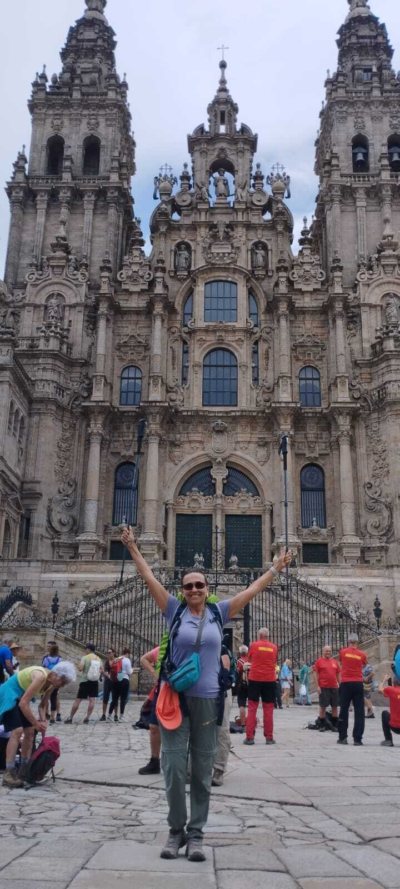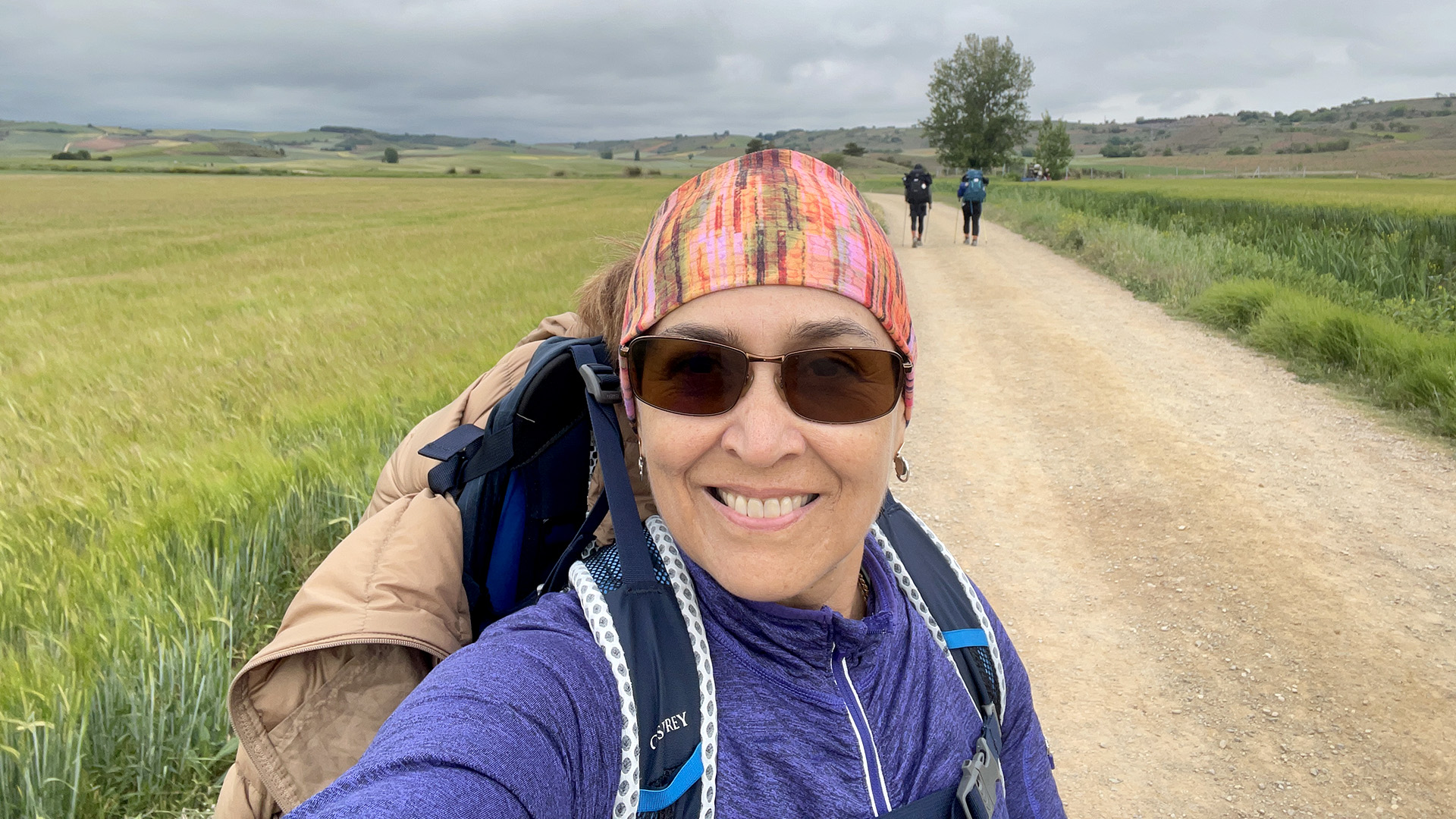By Cecilia Calderón – October 2023
“You are going to do what?”
“I am going to walk 500 miles across Spain!”
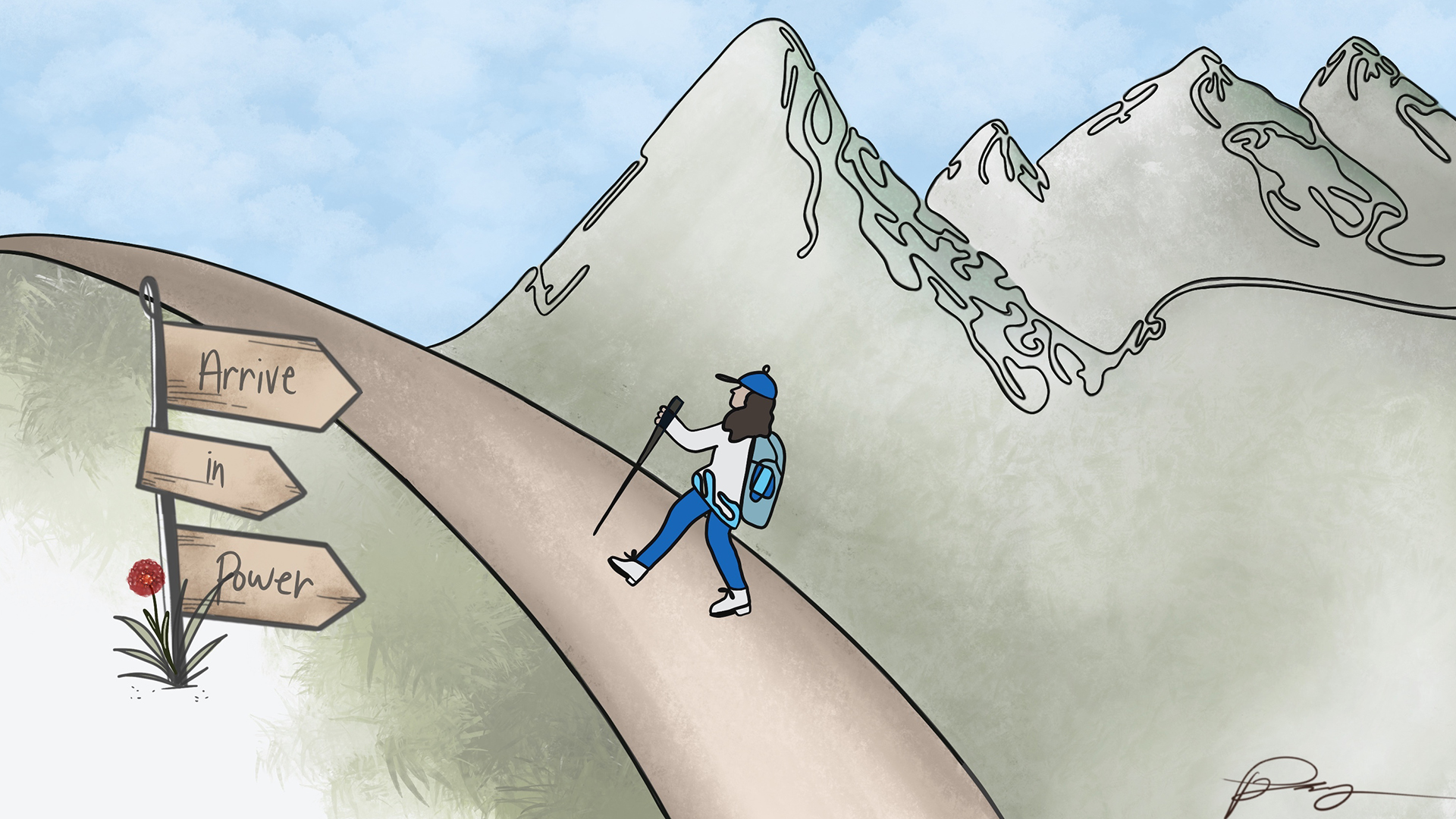
The Call of The Camino
The first question I’m always asked is “Why?” I wish I had a specific answer, but I don’t. Sometimes you just feel the call, and 10 years ago I heard the call of the Camino. For years it was a very subtle call, sometimes making it to my bucket list and at other times falling off. At the end of 2019, I felt some winds changing internally without clarity of what they were, and not wanting to know either. I felt a need for solitude, so walking the Camino shot to the top of my list. I planned the Camino for May 2020. Well, everyone knows why those plans came crashing down. Today, in hindsight, I know it wasn’t yet my time.
With 2023 came stronger and clearer winds of change, and the Camino’s call was irresistible. Facing a deeply personal crossroads, I made my plans, and on May 12, I was in Saint Jean Pied de Port, France, ready to begin my pilgrimage.
The Camino, or Way of St. James in English, is a route to the shrine of the apostle St. James, where he is believed to be buried in the Cathedral of Santiago de Compostela in Galicia, northwestern Spain. Many take on the trek, as has been done for 1,200 years, as a form of spiritual learning or personal growth.
The Camino is mostly a rural journey, however it passes through several big cities. I chose the Camino Francés, or the French Way, which cuts across Spain from the Pyrenees to Santiago de Compostela.
The Camino teachings began to surface on day one.
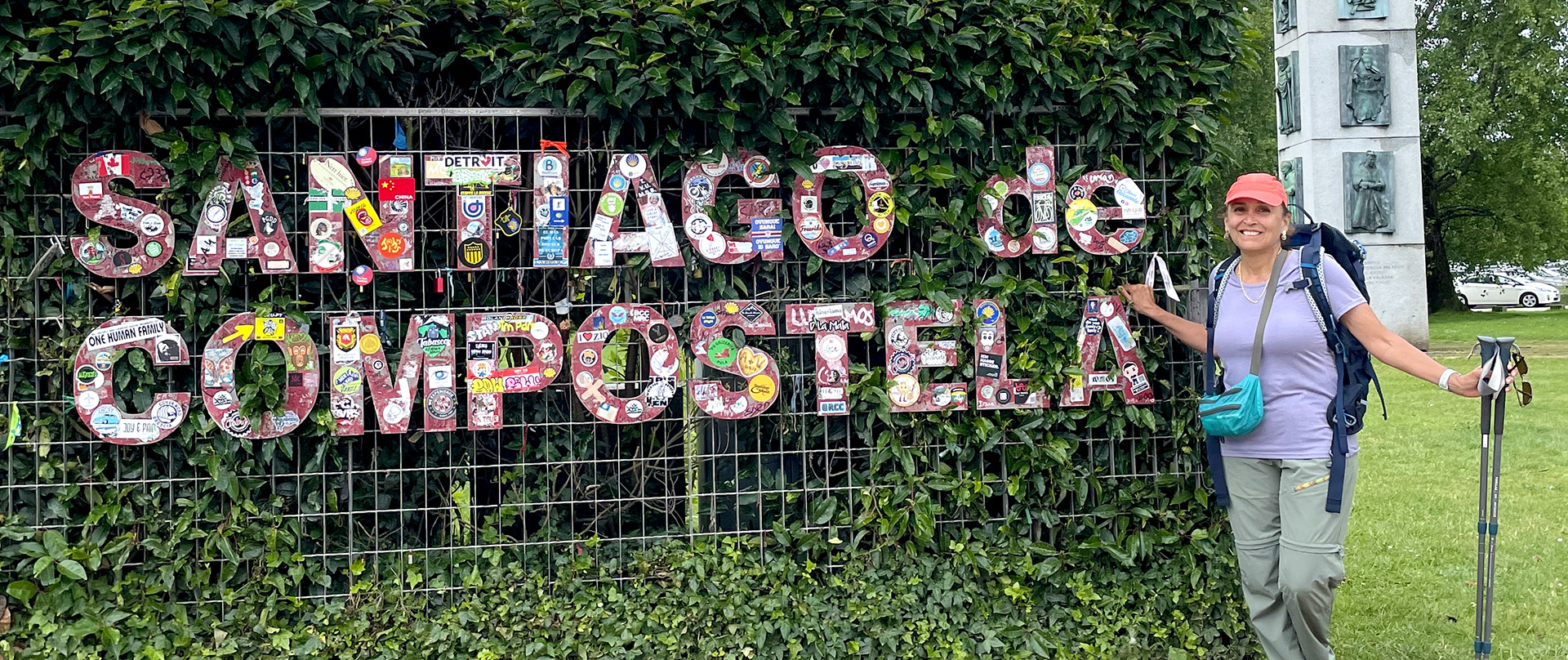
Finding My Own Pace
I left the Albergue, (a Pilgrim Hostel unique to the Camino, offering dormitory-style accommodations at an affordable rate) at 7:00 am ready for my first 15 miles. This leg of the journey would take me across the Pyrenees to Roncesvalles. Alone, confident, and feeling great I took my first steps into the unknown.
Moments later, I heard voices, and a group of three passed me. I increased my pace, but soon another pair of pilgrims passed me. I increased my pace once more to match theirs. I tried my hardest to keep up with the younger and faster groups while going up a significant elevation, but struggled to catch my breath. Suddenly a thought entered my mind: Why am I going so fast? What’s the rush? Who said their speed is the right one? As I answered these questions others began to pop in my head. Ceci, why are you always in a hurry? What have you gained or lost for moving so fast? Why have you match someone else’s pace instead of setting your own?
As the answers began to emerge, my pace slowed, and another question came to me. What gift could I see if I walked at my own pace? Four months later, I am still figuring out what my pace is.
On this first day I met Rafael, a man walking with his family. I saw he was zigzagging his way up another incline and asked him what that was all about. He told me this was something he learned as a child in Tenerife, and although it increases the total number of steps you take, each step was gentler on the body.
How often do we want to “get there” faster, going as far as skipping steps? Zigzagging instantly became my metaphor for “what’s the rush, Cecilia? Why are you moving so fast?” There’s a time and place for everything, and there will be times I’ll need to move fast, but from now on, I will own my pace.
The Trap of Expectations
Expectations! Another big lesson. We must understand that often expectations are traps: when we hold on to them for dear life, we usually end up falling on our face. For instance, I knew the Pyrenees crossing would be challenging but breathtaking. I had seen so many photos, videos, and documentaries, and I was so ready! However, on that first day, besides trying to keep up with faster walkers, I faced cold, rain, wind, and fog, and the Pyrenees remained hidden the entire day.
I had to let go of my dream photos to see the beauty of walking through the clouds. I needed to let go of my frustrations to appreciate my fabulous big rain poncho that protected me from the cold and rain, relish the random food truck in the middle of nowhere, and be present with my fellow pilgrims as we began this shared journey. I treasured all of those beautiful things, and I may have overlooked them on a clear day. How do expectations get in the way of joy in our daily lives? Does this sound familiar to anyone?
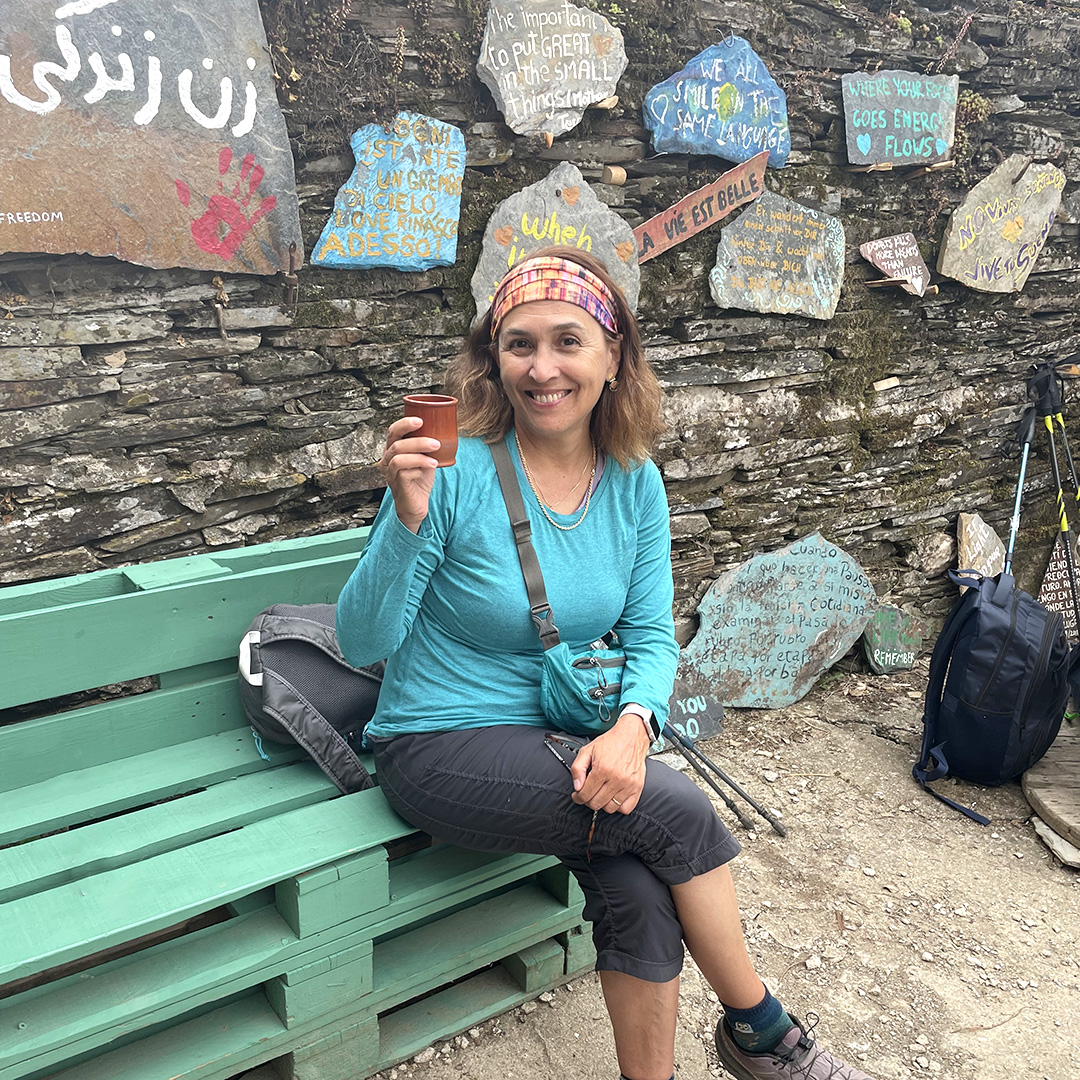
Expectations & Change
On another day, after a particularly difficult ascent (Alto del Perdón), I overheard a group of Australian pilgrims say, “ufff that was hard, and what goes up must come down, watch out knees!” Boy did it come down! There were many ascents and descents along the journey. The ups and downs of the Camino became a metaphor for life. We are all familiar with the painful “up hill sections” in life, and often we look forward to the “down hills”, thinking they will be less painful, but beware, sometimes, they can be just as treacherous—as my knees discovered.
There are many guides and resources to help you plan and prepare for the Camino, each with suggested stages. I took these suggestions as I had a limited timeline (33 days) and planned accordingly. As the days progressed, I realized, the suggested guidelines were just that, suggestions. I learned that there are many ways to do things. My Camino is my Camino.
Plans are necessary as they help optimize your times and minimize inconveniences. Make the plan, but also remain open and ready for circumstances to change. We can, and should, stay flexible to modify any plans.
Changes can be welcomed, like meeting a nice group who invite you for a café con leche at the next stop, or they can be unwelcome. Things like sudden rain leaving you wet and cold. Hoping for a warm meal, but only having an apple for several miles. Reserving a bottom bunk but getting a top bunk instead. Expecting a restful night’s sleep but being kept up by loud snores. Or loud pilgrims waking you hours before you expected to begin the day.
When these situations occurred, I learned to take a deep breath, and on the exhale release the expectation, the plan, my need for control, and welcome the unexpected. How do we adjust when things change at work or in our personal lives? Do we resist and try to push hard for what we want things to be? I do this all the time, and it is exhausting. In the Camino, I learned that it’s not that hard to take a deep breath and let go. Since returning, I have taken a lot of deep breaths.
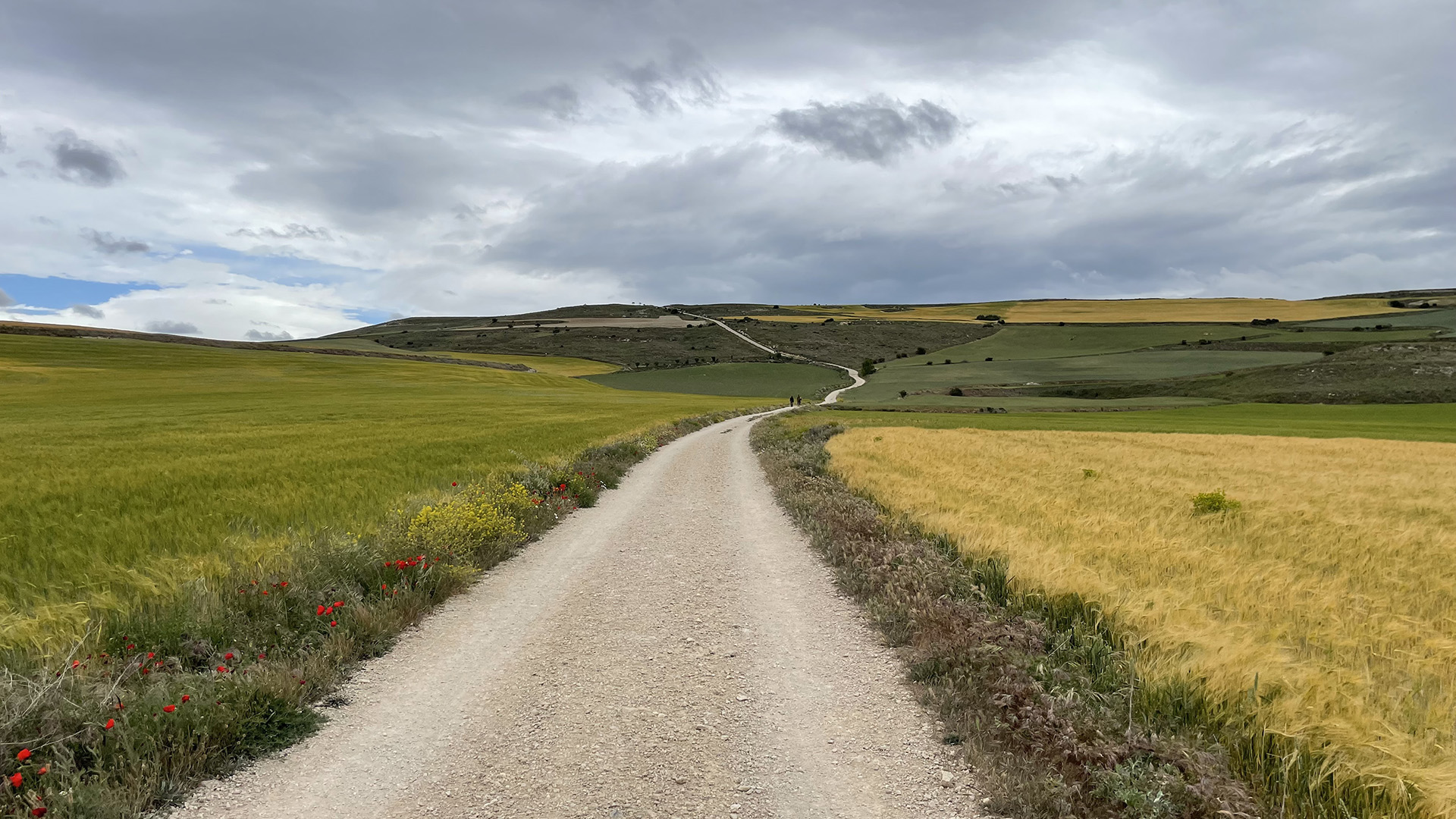
Avoiding Difficult Conversations
Most of the trails on the Camino are gravel. One morning, I felt a tiny, little something in my shoe—maybe a pebble. I shook my foot to move it, and I continued walking. A few miles later, I felt it again, but I was too lazy to stop. It was just a minor annoyance, and it was a big inconvenience to find a stopping place, take off my pack, sit, and take off my shoes just for a tiny pebble. So, I kept going and tried to ignore it rattling around in my shoe.
That small bother turned into pain just a few miles later, and I finally stopped. I took off my shoes, the tiny pebble rolled out, and I was left with a painful blister on the bottom of my heel. Argh! Why didn’t I stop earlier before it was too late?
How often do we tolerate something or someone and avoid having the difficult conversation hoping that the issue will go away or resolve itself? Usually, it doesn’t, and we have to deal with a much larger issue later. Then the work and resources required to fix the new problems are much larger.
I had to “baby” that blister for days so it wouldn’t grow worse—blisters when you are walking on average 15 miles a day are not fun.
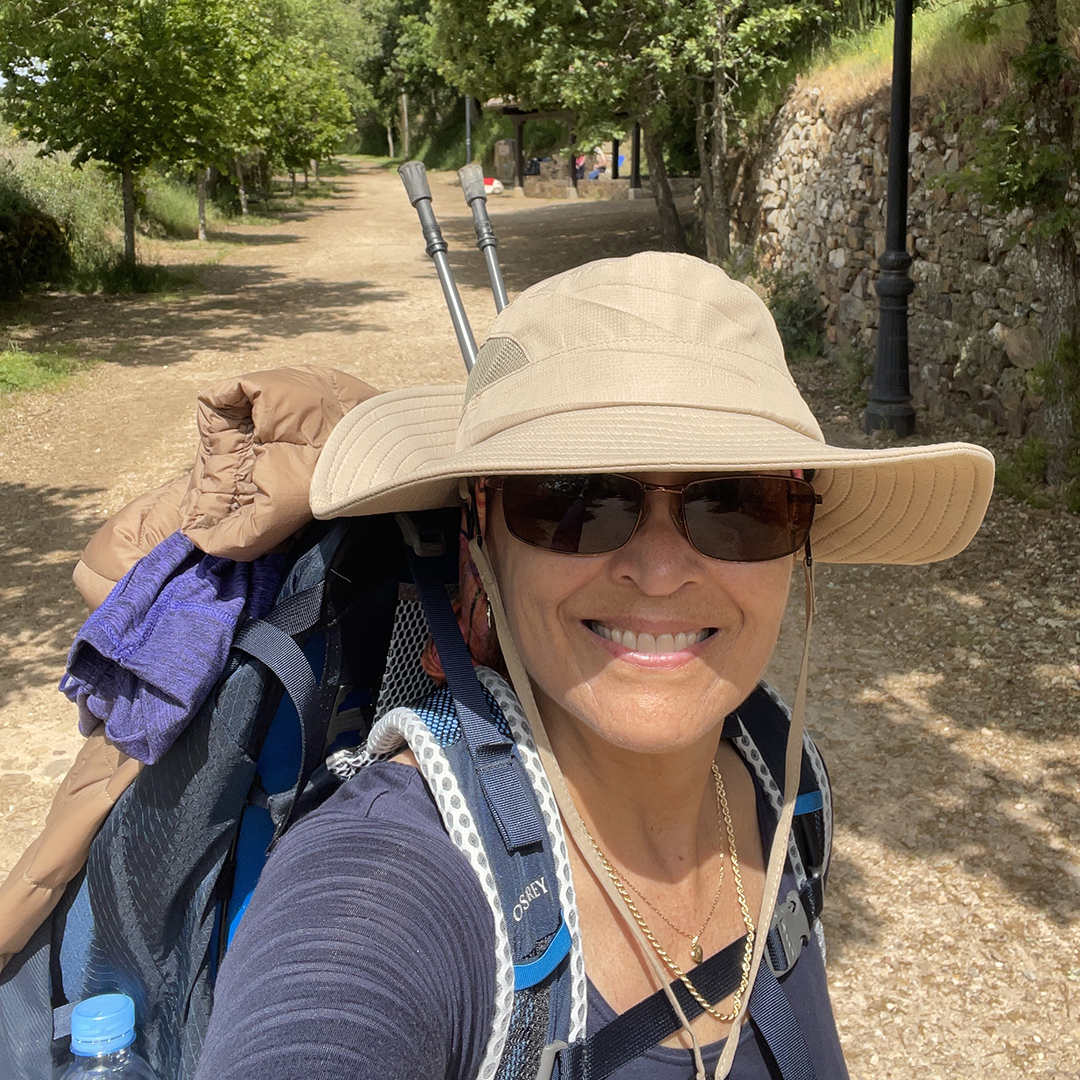
The Burdens We Carry
For the first 250 miles, I carried all my worldly possessions in my backpack that weighed 17 pounds. I had heard that there was a daily courier service that would carry your backpack to your next albergue or destination, but I wanted to be a “purist” and carry all my belongings myself. After two weeks, my hips and knees were feeling the strain of the additional 17 pounds, and on a particularly hard day, something hit me. I realized that I had been carrying a lot of weight in life that I didn’t need to carry, and that I was doing the same thing in the Camino. It was time to shed some weight. So, I hired the courier service to move the heaviest things to my next destination.
How much unnecessary weight are you carrying? What stops you from shedding this extra weight? It felt wonderful to walk lighter, both literally, and metaphorically.
The Cruz de Ferro, or Iron Cross, is one of the most important milestones of the Camino Frances. At the foot of the cross, hundreds of thousands of pilgrims over hundreds of years have deposited a stone which they carried along their journey, representing what they wish to leave behind—what no longer serves them.
Lots of emotions visited me as I sat there – deep sadness, shame, anger, guilt, fear, regret. My tears flowed freely and mine were not the only ones. There was a kinship, a silent solidarity amongst pilgrims—a truly sacred moment. I deposited my stone and continued my trek. The rest of that day’s walk was about what I want in my life – love, joy, courage, adventure, forgiveness, and peace.
How often do we stop long enough to go deep into our heart and connect with what is truly important? Only then can we be intentional in creating what we do want.
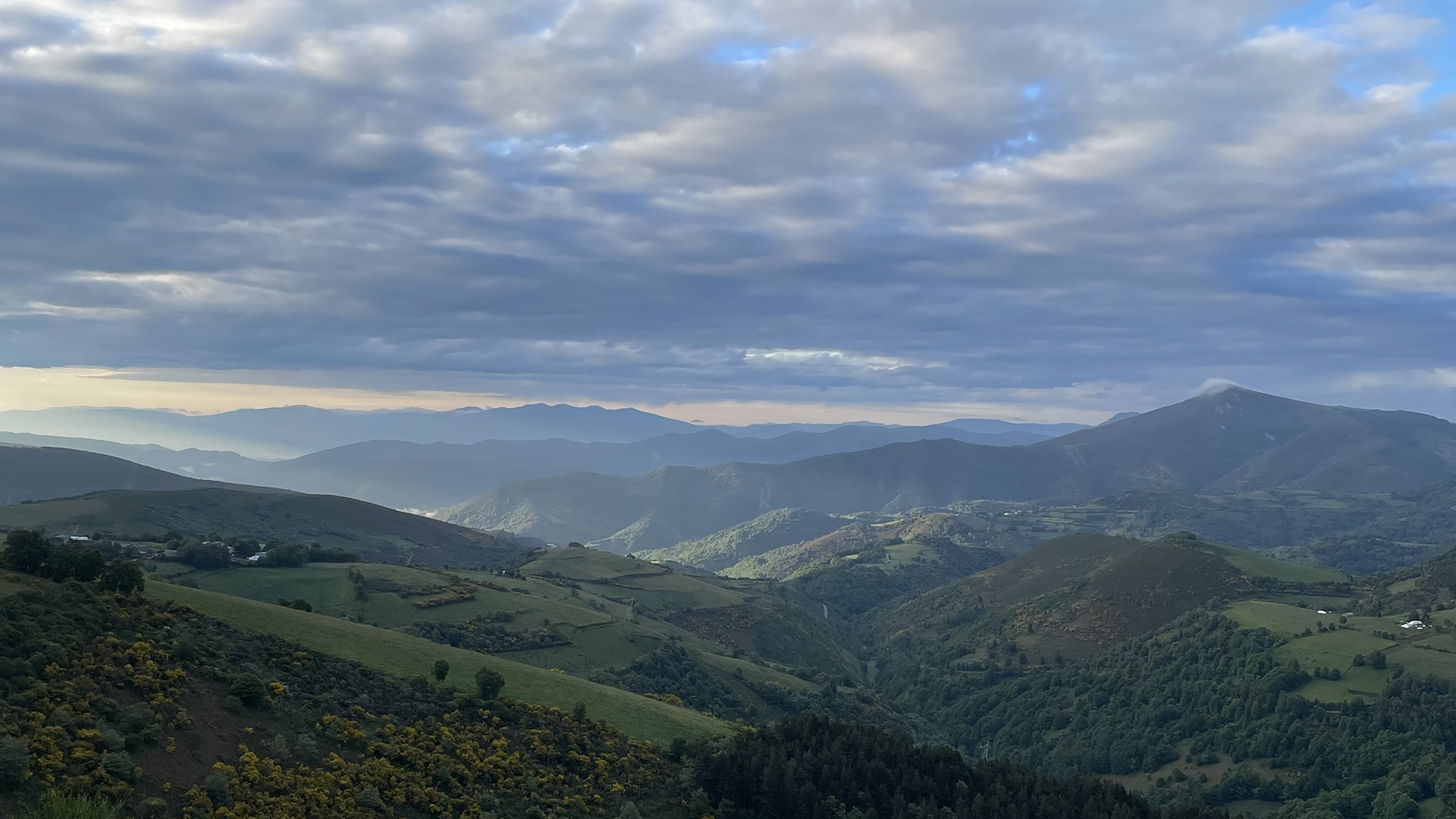
The Messy Middle
The Camino has a clear objective, a clear destination – The Plaza de Obradeiro, the main square in Santiago next to the Santiago de Compostela Cathedral. However, as in life, the real treasure and magic is in the journey.
How often do we miss the learnings and enjoyment of the “messy middle” because we are so narrowly focused only on the results/destination? Yes, the goal is the goal, and we will do everything to get there, but what wonders can we see if we focus more of our attention and energy on the journey itself? The small milestones achieved, the daily challenges, and what about the people who travel with us, our teams, peers, friends, and families?
Along the Camino, I made what I hope to be lifelong friendships, but sadly, I will never see or hear from most of my fellow pilgrims again. However, I will never forget the people I met, the conversations we had, and the dreams we shared. Those moments we shared will stay with me forever.
Arriving With Power & Purpose
Nature has a way of resetting our body’s compass and our mindset. Being out in nature every day for most of the day allowed me to disconnect and welcome simplicity. I need more of this in my life, I believe we all do. Simplicity brings into focus what matters most. A question that has remained with me is how do I take care of those things that matter most to me?
Entering the city of Santiago, with the Cathedral spires in the distance I felt the force and magnitude of my achievement. Arriving at the Praza do Obradoiro with the magnificent Cathedral was extraordinary. A destination so desired it felt a bit overwhelming. I felt awe, pride, and the full power of my strength. If I did this, I could do anything.
I know life will present things whether I am ready for them or not—whether I want them or not. These Camino teachings are helping me set the course for the future and the life I want to create—the life I want to live. I returned four months ago, and the Camino, the people I met, and all of the learnings are ever-present in my heart and mind.
I walked 500 miles across Spain, a journey thousands of pilgrims have made for more than 1,000 years. This journey allowed me to connect with my own self, my own heart in an incredible way I had never before. I am full of gratitude and awe. Buen Camino!
